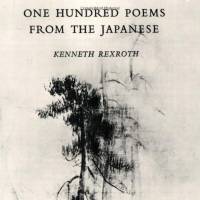Kenneth Rexroth was heavily influenced by the moods and modes of Japanese poetry, which in turn reached those who were influenced by him. Named by Time Magazine as the “father of the Beats” and a friend of that other great Japanophile poet, Gary Snyder, Rexroth famously passed off his own poems “in the Japanese style” as those of a young female Japanese poet.
But these "100 Poems from the Japanese," first published in 1955, are translated by him. Eschewing the more common approach of bringing together famous haiku poems, this collection ranges over styles, forms and eras and makes a good attempt at gender balance among the authors.
Rexroth was known for his erotic poetry, as well as his love of nature, so perhaps it's not a surprise that both are represented in his selections. His twin interests are combined in a melancholy poem by Hitomaru, where the rustle of the grass in the wind makes the poet "think of a girl/ Who is not here."
A movingly frank and startlingly modern-sounding poem by Lady Suo from the 11th century talks of being the victim of gossip despite the "night I spent/ pillowed on your arm" being nothing more than a dream.
But it is Ariwara no Narihira's musing on impending death that is most startling. Rexroth retains both the power and simplicity in his translation, when the poet realizes, though he has always known that someday he would die, "I did not know that it would be today."
Read archived reviews of Japanese classics at jtimes.jp/essential.



















With your current subscription plan you can comment on stories. However, before writing your first comment, please create a display name in the Profile section of your subscriber account page.